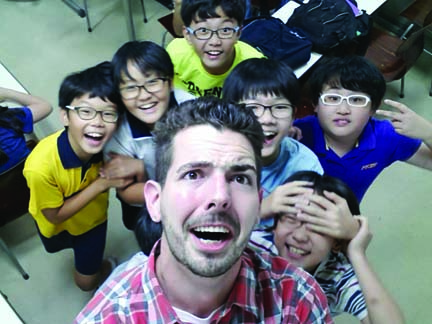Elizabethton traveler teaches English to South Korean children
Published 10:00 am Sunday, July 26, 2015
Elizabethton native Luke Roark has been bitten by the travel bug.
“I studied in Costa Rica,” he said. “I spent a month in Mexico. I cruised down to the Bahamas and the Grand Cayman Islands. I moseyed around Japan. I have spent some time backpacking throughout the Philippines, Vietnam, Laos, Thailand, Malaysia, Singapore, Cambodia and Sri Lanka. I made a couple of pit stops in China, India, Qatar and Germany.”
Roark doesn’t travel solely for the purposes of leisure either. For his most recent expedition, he was on a mission to help educate South Korean children. He did this for 2 1/2 years.
“I taught English as a second language,” Roark said. “My students ranged from second to sixth grade. I taught reading, writing and speaking classes.”
So, how did he get there? It all started with a college study-abroad program in 2009.
“I lived in Costa Rica for a summer,” Roark said. “After that trip, I knew that I would not be personally satisfied unless I kept traveling.”
His desire to travel trumped his former goal to attend law school.
“I graduated, took the LSAT, and ultimately realized that being an attorney wasn’t what I really wanted to do,” he said. “I had a friend teaching in Korea who gave me information about working there. Before I knew it, I was getting ready to move to Asia.”
Roark worked with students who possessed various levels of fluency in English. He said they were grouped by ability, not age.
“I was often the first foreigner the students had as a teacher,” he said. “Now some future Korean business professionals could potentially be speaking English with an Appalachian dialect.”
In his opinion, Roark saw no differences when comparing American students with Korean students.
“Students are students,” he said. “You have motivated kids, and you have others who need inspiration. I feel Korean students focus more on memorization and facts. American students are encouraged to use more free-thinking skills.”
Learning did not just occur on the student side of the classroom, Roark said.
“I learned about myself,” Roark said. “I am now aware of my extent of patience. I learned that my jokes aren’t always funny. I learned that getting a message across to a student and seeing them apply it is an extremely rewarding experience.”
Roark could not think of any other job he would rather do.
“My biggest takeaway is the satisfaction that I know that I am doing what I love,” he said. “I got to see some amazing places in the world. I got to meet wonderful people and eat incredible food. There isn’t much more that I could ask for.”
Roark struggled at first to understand the Korean culture.
“At first, I felt like I was living in a different world,” he said. “Every country is unique, and Korea is no different.”
He quickly learned that day-to-day social interactions in Korea are based on a system of hierarchy.
“A significant amount of importance is placed upon the older generation,” Roark said. “The oldest person sits first. The oldest person eats first. The oldest person can be the first to the leave the table.”
Confucianism influences the country greatly, Roark said.
“Even simple gestures like giving and receiving have to be done a certain way to not offend someone,” he said. “A person has to keep in mind that the culture and customs of Korea have a longer history than the United States.”
The differences in culture were frustrating at times, Roark said.
“However, I realized that to them, my mannerisms and customs are different,” Roark said. “I learned that I was living in their country, and I was the one who needed to learn how to adapt. Once I did, my transition went smoothly.”
Living in Nowon, which is a neighborhood within the nation’s capital, Seoul, allowed Roark to pursue some of his other passions as well.
“I went to Korea to live in a city where I could pursue my hobbies,” he said. “I released a hip-hop album, attempted to develop my painting skills, frequently hiked, and played a substantial amount of basketball.”
Overall, Roark realized that whether a person identifies as being American or Korean, they can both identify with being human.
“I learned that people are the same wherever you go,” he said. “All people have the same basic needs and wants. People get hungry, happy, sad and angry. People want to be loved and feel accomplished. Overall, I learned that regardless of nationality or language, all people have primal connections that link us all together.”
Still, Roark has discovered that culture shock, even in reverse, is an after effect from traveling.
“I have been back for almost two months,” he said. “Reverse culture shock is a real thing. It was overwhelming to be able to understand everyones conversations at first. I still find myself bowing occasionally. Time will iron out all of the ruffles. I am taking the necessary steps to reintroduce myself into the culture of Carter County.”
While he is still making the transition back into the American lifestyle, Roark is not making a transition back to the person he was before he left.
“To me, there is nothing more rewarding than immersing myself into a different culture,” Roark said. “I like to meet locals, eat traditional foods, and find myself completely outside of my comfort zone. When I get lost, I often find something that I keep with me forever.”
Roark has offered some hints and tips to help other people experience teaching abroad.
“There are tons of recruiting agencies that look for teachers,” he said. “Eslcafe.com is a popular site that you can submit your resume. A simple online search of ‘teach ESL’ will bring up loads of information.”
As for the person who wants to simply travel and experience the world, Roark said to stay focused on the goal, not the uncertainties.
“My advice is to not let the ‘what if’ questions scare you from doing something,” he said. “I feel people let questions of the unknown dominate their thinking process. Once you step on the plane, train, boat, or get in the car, you become committed to where you are going. Then, all those questions disappear, and you have a new list of issues that need your attention.”




